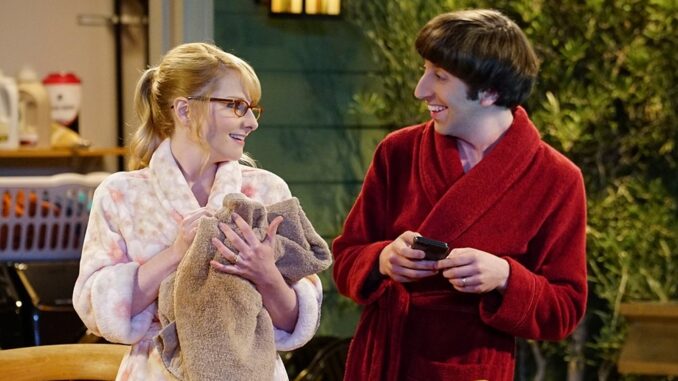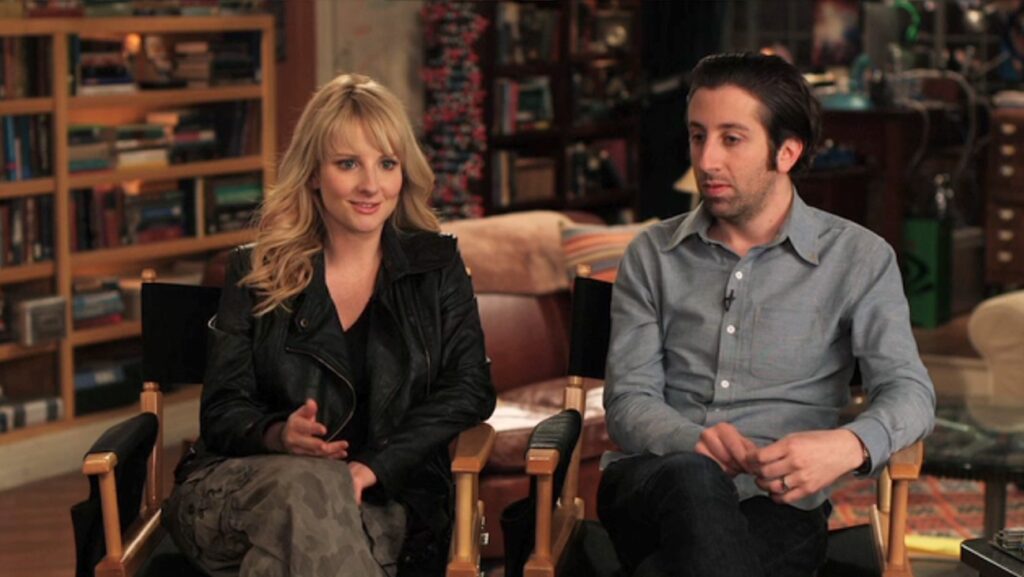
Not all on-screen couples share a bond off camera, but “The Big Bang Theory” stars Simon Hleberg and Melissa Rauch built a real-life friendship as charming as their characters’ love story. As Howard Wolowitz and Bernadette Rostenkowski, they brought a unique chemistry to the show that challenged the conventions of sitcom relationships.
Rauch joined the show in Season 3 when she was cast as a love interest for Helberg’s character. During a June 2015 interview with Gold Derby, Rauch revealed that Bernadette was meant to be a one-off guest role. However, her appearance on the show sparked a decades-long collaboration, with Rauch’s character becoming a core part of the series in Season 4.
While many Hollywood actors have fallen for their on-screen love interests, Helberg and Rauch kept their relationship professional. But through the show’s 12-season run, both have shared a few glimpses into their off-screen bond, speaking openly about their mutual admiration and respect for each other.
Simon Helberg Felt Relieved When Melissa Raunch Joined The Show
Before the Bernadette era, many of Howard’s storylines revolved around his inappropriate humor and sleazy attempts at romance. While these traits were played for laughs, they often alienated audiences. Reflecting on those early seasons, Simon Helberg acknowledged in Jessica Radloff’s book “The Big Bang Theory: The Definitive, Inside Story of the Epic Hit Series,” “People were very unhappy with some of the things Howard would do or say, and I was like, ‘Yeah, I agree.'”
Melissa Rauch’s arrival in Season 3 as Bernadette Rostenkowski turned out to be a pivotal moment for both Howard and Helberg. Her character gave Howard a romantic arc that saw him evolve from an immature womanizer to a husband and father. Bernadette helped humanize Howard, making him more relatable and endearing to audiences. Helberg himself remarked, “It certainly was more fun to play him as his heart got bigger and he shed his layer of sleaze.”
Rauch’s introduction also expanded the show’s creative scope, allowing the writers to explore more engaging storylines that would resonate with a broader audience. This shift undoubtedly contributed to “The Big Bang Theory’s” rise as one of the most beloved sitcoms of all time. Looking back, Rauch’s addition wasn’t just a relief for Helberg; it was a defining moment that made the show an even stronger ensemble comedy.
They Had A United Front When Addressing Creative Concerns
During their time on “The Big Bang Theory,” Simon Helberg and Melissa Rauch rarely voiced their concerns about the storylines. However, according to “The Big Bang Theory: The Definitive, Inside Story of the Epic Hit Series,” one notable exception came during Season 9 when the writers decided that Howard and Bernadette would have a baby.

Rauch admitted she was worried about how a baby might shift the dynamic between the existing characters. Helberg echoed her concerns, saying, “How would we sit around and have Chinese food? What happens to our role in the group? Not from an ‘Oh God, I’m going to be written off the show’ vein but from a place of loving what we had created on the show.”
In the book, Radloff details how Helberg and Rauch recognized these potential issues and teamed up to approach executive producer Steve Molaro. Luckily, Molaro assured them it wouldn’t change the show’s dynamic because they never planned to show the baby on camera. This kept the ensemble cast’s dynamic intact while allowing the show to explore new storylines, such as how Howard and Bernadette’s journey into parenthood affected the group. Helberg and Rauch’s collaboration in addressing creative concerns underscores their strong professional bond and shared commitment to protecting their characters and the show.
Simon Helberg Took A Paycut For Melissa Rauch
At the height of their show’s popularity, Jim Parsons, Johnny Galecki, Kaley Cuoco, Simon Helberg, and Kunal Nayyar were among the highest-paid actors on television. However, there was an increasingly apparent pay gap between the original stars of “The Big Bang Theory” and newer additions like Melissa Rauch and Mayim Bialik (who played Amy Farrah Fowler).
Variety reports that by Season 10, the original cast was earning a whopping $1 million per episode. Meanwhile, Rauch and Bialik’s characters, who appeared in every episode and were integral to the ensemble dynamic, were paid only $200,000 per episode.
Recognizing this disparity, Helberg and the rest of the cast voluntarily took a $100,000 pay cut to secure raises for both Bialik and Rauch. This act of solidarity reflected their commitment to fairness and acknowledged Rauch and Bialik’s invaluable contributions to the show’s success. It also reveals how the whole group, not just Helberg and Rauch, had a very tight-knit relationship both on- and off-screen, which no doubt contributed to the show’s longevity.
Simon Helberg And Melissa Rauch’s Lasting Friendship
After “The Big Bang Theory” ended its 12-season run in 2019, the cast went their separate ways but have maintained tight-knit bonds. Simon Helberg has continued to praise Melissa Helberg, reflecting the mutual admiration they cultivated over years of collaboration.
In “The Big Bang Theory: The Definitive, Inside Story of the Epic Hit Series,” Helberg reflects fondly on his time on the show with Rauch, saying, “She really is the kindest, gentlest person. … I might have exploited her as some kind of makeshift therapist throughout the years because her eyes are just enveloping so you let go completely.” Rauch echoed a similar sentiment during a 2024 interview with Entertainment Tonight. “I think we’ll always be a part of each other’s lives,” she shared. “We’re just always in each other’s hearts, and it’s just family forever.”
Helberg and Rauch’s statements underscore the camaraderie they shared on set and exemplify how a strong off-screen bond can enhance on-screen performances. The former castmates’ continued off-screen friendship also highlights how bonds forged on set can sometimes outlive the shows themselves.